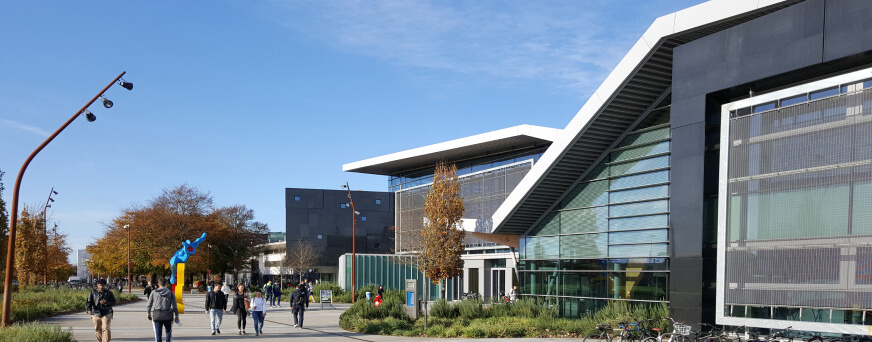Explore University of McCordsville’s Eligibility Criteria for Students Worldwide
High School Diploma, GED or equiv. International Education
144 Hours
4 Year (Self-Paced) Program
24
The course explores philosophic and artistic heritage of humanity expressed through a historical perspective on visual arts, music, and literature. Topics include myth, literature, art, music, television, cinema, and the theater. Also discussed are provocative issues in the humanities - religion, morality, happiness, death, freedom, and controversies in the arts.
Social and Cultural Geography considers why geography matters to the analysis and understanding social relations, cultural identity and social inequality. Course examines how social life is structured at a variety of scales with respect to ethnicity, industries, services, urban patterns, and resources of world as a whole.
English Composition provides you with rhetorical foundations that prepare them for academic and professional writing. You will learn the strategies and processes that successful writers employ as you work to accomplish specific purposes. You will develop skills in writing unified, coherent, well-developed essays using correct grammar and effective sentence structure.
College Algebra provides an overview of the fundamental concepts of algebra: an understanding of the general concepts of relation and function; and the ability to solve practical problems using algebra.
World Religions course offers the broadest coverage of world religions as they exist today; helping you understand the ideology behind the many religions that strive today. While it is impossible to cover all religions, it does cover those of the vast majority of people.
Evenly balanced between theory and applications, this course shows you how to establish an ethical theory and how to apply it to a range of specific moral issues. This course examines ethical problems in such areas as mercy killing, personal relations, business, sexuality, medicine, and the environment.
This course introduces the origins and historical development of art. Emphasis is placed on the relationship of design principles to various art forms including but not limited to sculpture, painting, and architecture. Upon completion, you should be able to identify and analyze a variety of artistic styles, periods, and media.
This course provides the mathematical foundation for an introductory calculus course. In addition to a brief review of basic algebra, the course covers equations and inequalities; functions, models, and graphs; polynomial and rational functions; exponential and logarithmic functions; trigonometric functions; and trigonometric identities and equations.
This course is an introductory study of the human body, including the basic structure and function of the major organ systems (nervous, endocrine, circulatory, reproductive, etc.) and the effects of diet, exercise, stress and environmental change on human health.
World History course present the big picture, to facilitate comparison and assessment of change, and to highlight major developments in world's history. This course emphasizes the global interactions of major civilizations so that you can compare and assess changes in the patterns of interaction and the impact of global forces.
This course provides a sociological perspective on crime and criminal justice by treating social structure and social inequality as central themes in the study of crime and major factors in society's treatment of criminals.
Sociology is a comprehensive course that offers you a global perspective to help you better understand your own lives, provides strong focus on social diversity that allows you to see the impact of race, class, and gender, and focuses
This course examines corrections from an academic view and from those who are at the center of the system. It includes correctional history and theory, yet concentrates on what professionals do, why they do it, and the challenges they face every day.
This course contextualizes current events within the criminal justice literature. Highlighting a variety of high-interest issues, it explains you how recent happenings relate to criminal justice studies.
This course explains the procedural aspects of the criminal justice system systematically, making the concepts easy to apply to any state’s specific procedural laws and procedures systematically.
This course presents crime detection as a dynamic field relying heavily on the past experiences of investigators as well as recent practical and technological innovations.
This course builds the procedural knowledge and real-world skills needed for today’s paralegal. It places an emphasis on profession and skills. Places an emphasis on basic foundations including: developing critical thinking and procedural skills; learning about technology applications in law office; and understanding how to handle ethical situations in workplace.
This course makes the comparative approach far more understandable and accessible, helping you recognize the growing importance of an international perspective. It organizes key concepts in a sequence that you will already find familiar; progressing from issues of law to the agencies of police, courts, and corrections.
This course provides an introduction to the basic methods, techniques, and procedures of social science research. Qualitative and quantitative methods, such as survey research, experiments, observational/field work, program evaluation, and interview approaches appropriate to the study of criminal justice are also examined.
This course is based on the origin, philosophy, and development of the juvenile justice system, particularly the juvenile court. Emphasis in this course is placed upon laws, detention, adjudication, probation, after-care, foster homes, and other alternative correctional practices.
This course examines the nature, trends, remedies, and explanations for juvenile delinquency. You will be introduced to basic terminology relating to juvenile delinquency and the juvenile justice system.
This course presents the evolution, philosophy, structures, processes and current issues of the juvenile justice system; it surveys the rights of juveniles, dispositional alternatives, rehabilitation methods and current trends.
The course is an analysis of the social administration of juvenile justice within the United States. Particular emphasis will be placed on the decision-making process on police, courts, and probation officials regarding apprehension and processing of juveniles in the United States.
This course covers the computer crime issues. In this course, you will be exposed to the concepts of basic computer hardware and software violations, as well as the role of social networking sites and peer to peer networking environments in criminal mischief.
| Tuition Fee Breakdown 1 | Cost |
|---|---|
| BACHELORS DEGREE | $31,680 |
| Medical Insurance | $0.00 |
| Personal Expenses | $0.00 |
| Study Materials | $0.00 |
| Food Cost | $0.00 |
| Total Tuition Fee | $31,680 |
At University of McCordsville, we champion the convergence of affordability and opportunity. Our steadfast commitment to accessible education guarantees that high-quality learning is accessible to all. By eliminating financial obstacles, we grant students the freedom to thrive without the burden of overwhelming tuition costs, empowering them to carve out a bright and promising future.

| Topics Covered in This Course: | |||||||||||||||||||||||||||||||||
|
| Topics Covered in This Course: | |||||||||||||||||||
|
| Topics Covered in This Course: | |||||||||||||||||||||||||||||||||||
|
| Topics Covered in This Course: | |||||||||||||||||||||||||||||||||
|
| Topics Covered in This Course: | |||||||||||||||||||||||||||||||
|
| Topics Covered in This Course: | |||||||||||||||||||||||||||||||||||||
|
| Topics Covered in This Course: | |||||||||||||||||||||||||||||||||||||
|
| Topics Covered in This Course: | |||||||||||||||||||||||||
|
| Topics Covered in This Course: | |||||||||||||||||||||||||||||||||
|
| Topics Covered in This Course: | |||||||||||||||||||||||||||||||||||||||||||||||||||||||||||||||||||
|
| Topics Covered in This Course: | |||||||||||||||||||||||||||||||||||||||
|
| Topics Covered in This Course: | |||||||||||||||||||||||||||||||||||||||||||||||||||||
|
| Topics Covered in This Course: | |||||||||||||||||||||||||||||||||||||
|
| Topics Covered in This Course: | |||||||||||||||||||||||||||||||
|
| Topics Covered in This Course: | |||||||||||||||||||||||||||||||
|
| Topics Covered in This Course: | |||||||||||||||||||||||||||||||||||||||||||||||||||
|
| Topics Covered in This Course: | |||||||||||||||||||||||||||
|
| Topics Covered in This Course: | |||||||||||||||||||||||||
|
| Topics Covered in This Course: | |||||||||||||||||||||||||||
|
| Topics Covered in This Course: | |||||||||||||||||||||||||||||||||||||
|
| Topics Covered in This Course: | |||||||||||||||||||||||||||||||
|
| Topics Covered in This Course: | |||||||||||||||||||||||||||||||
|
| Topics Covered in This Course: | |||||||||||||||||||||||||||||||||||||
|
| Topics Covered in This Course: | |||||||||||||||||||||||||||||||
|
“Every minute spent under the guidance and supervision of the University of McCordsville was worth it for a student like me.”

“An amazing online platform, supportive staff, and valuable career resources. I highly recommend the University of McCordsville.”

“Scholarship opportunities, personalized support, and impactful learning. I am grateful for my journey at the University of McCordsville!”
